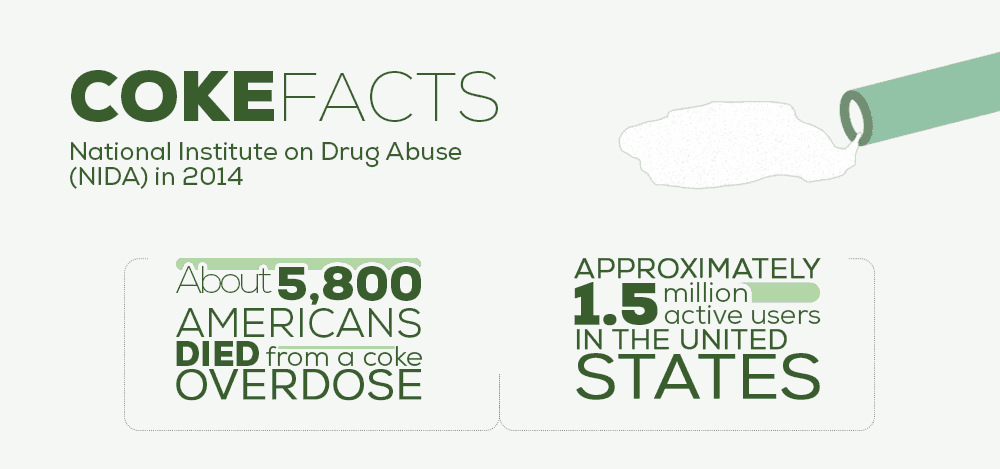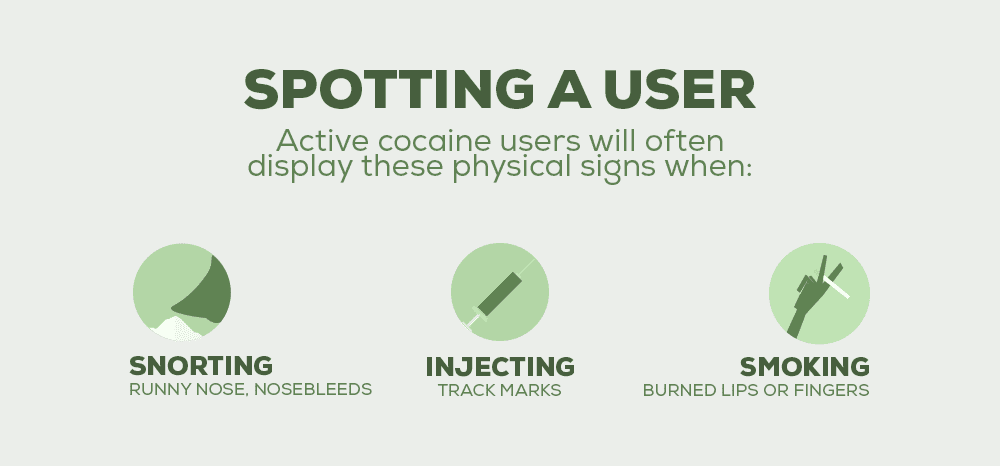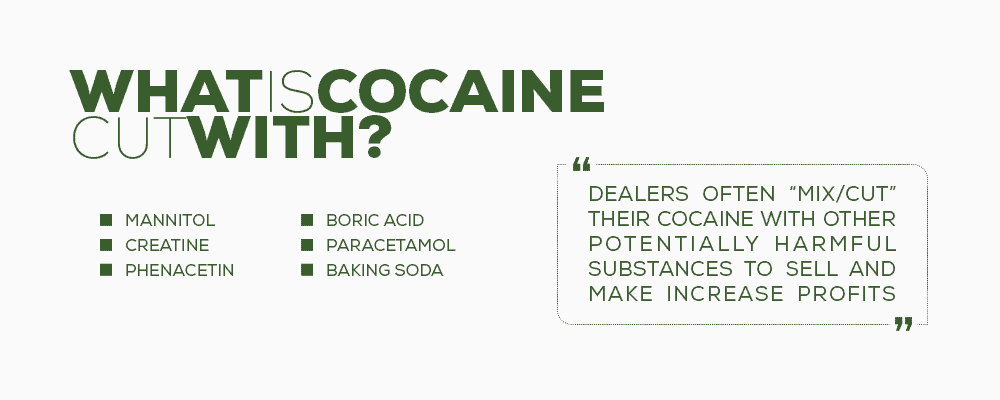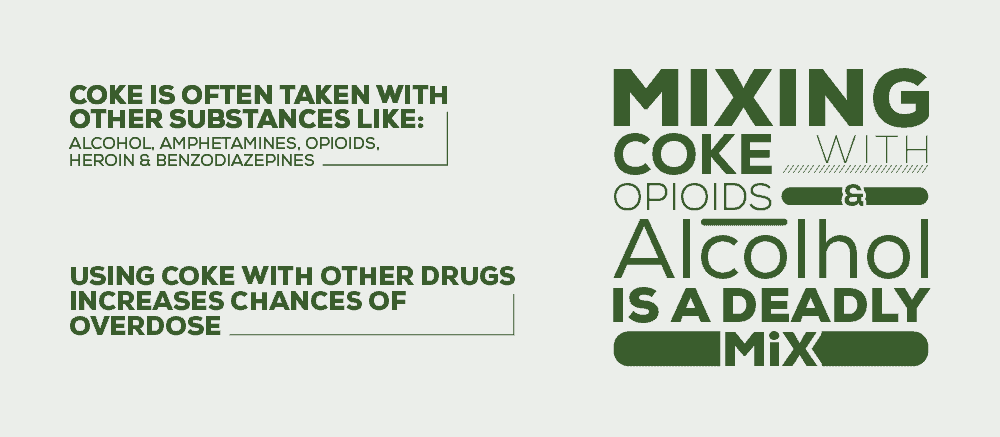Cocaine. The word itself strikes fear into the hearts of many. Its reputation for destroying lives makes it one of the most feared substances on the planet. And, rightfully so. It ranks as one of the most addictive drugs known to man. Most people are hip to this reality. After all, we were taught about the dangers of illegal drugs in school. Yet, this hasn’t stopped millions of Americans from trying coke and getting hooked on the stuff.
“Get your loved one the help they need. Our substance use disorder program accepts many health insurance plans, this is our residential program.”
Let’s Talk About Coke (The Drug, Not America’s Fave Soda Pop)
Since the 1960’s, this potent stimulant killed some of the most iconic figures in pop culture. Nevertheless, it remains one of the most popular drugs in the entertainment industry. Plus, cocaine is a favorite substance among countless people who live a life outside the spotlight. So, what’s the big deal about cocaine? Why do so many people continue to use it when they know how dangerous it is? What is so special about this stuff that it has the power to grab people by the soul and drag them to an untimely death? Let’s have an honest conversation about this drug. Maybe we can answer some of these questions. If you’re experimenting with the stuff, you’re headed for trouble. If you’re hooked, you’re going to need help to quit. We want to give you the whole story about coke. It might save your life. 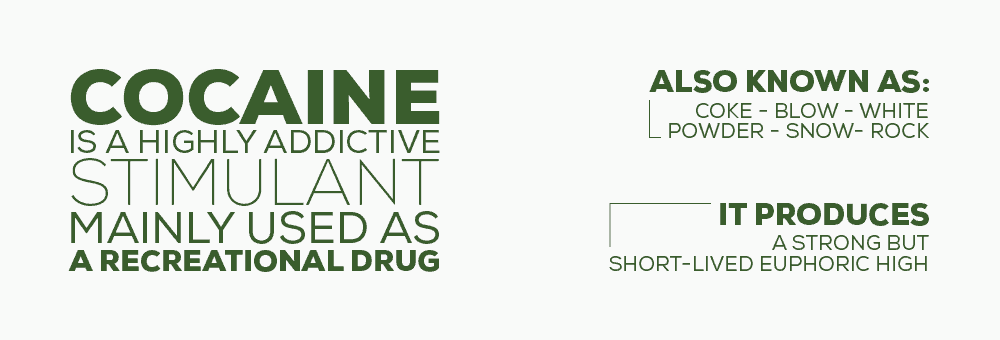
Insane in the Membrane – The Brain on Cocaine
Also known as coke, blow, white, powder, snow, and rock; cocaine is snorted, injected, and smoked. It is a fast-acting substance that surges the bloodstream almost immediately. The drug delivers a powerful rush of chemicals to the brain, which causes an indescribable euphoric experience. It is this high that keeps users coming back for more (and more and MORE!). Because the cocaine high is short-lived, it induces cravings almost immediately. Someone who uses this drug will often snort, shoot, or smoke it obsessively for days on end without food or sleep. To sustain the high, many will drain all their financial resources to chase the buzz. Using this drug causes most people to be extremely paranoid. Many addicts admit that when they get high, they stare out the peephole or the window. They become convinced that the police or FBI are about to raid their house. Coke is so detrimental to the brain, it can even induce psychosis. In short, white can cause you to lose touch with reality and go temporarily insane. 
Coke Overdose is a Very Real Consequence For Users
According to the National Institute on Drug Abuse (NIDA), about 5,800 Americans died from a coke overdose in 2014. This is the most current data available. That same year, there were approximately 1.5 million active cocaine users in the United States. Of this number, about 913,000 met the criteria for addiction. However, many people believe this estimate is far too low. Coke is a highly coveted drug. People from all walks of love the stuff. This is evident by the mass quantities of white being trafficked across the country.
Americans Love Their Cocaine
Let’s give you an idea of just how popular powder is in the United States. The United Nations Office on Drug and Crime reported that approximately 140 tons of coke were seized in 2015 alone. That’s 280,000 pounds – or the equivalent of 42 elephants. Yes, it’s a lot of blow. Yet, it’s not even a fraction of the amount that actually made it into the hands of recreational users and addicts. Cocaine does not discriminate. People from all socioeconomic backgrounds, education levels, races, ages, and religions use this substance in mass quantities. Powder is definitely more expensive than the smokable form of the drug (called “crack”). But, no matter how you use it, people who are hooked on white are willing to go to any lengths to get more.
“We treat both addiction and co-occurring disorders and accept many health insurance plans. Take a look at our inpatient program.”
How One Famous Recovering Addict Describes Coke Addiction
Beloved singer Eric Clapton best describes the effects of powder in his popular 1977 song, “Cocaine.” The lyrics go like this: If the day is done, and you wanna ride on…..cocaine” Here, Clapton describes the stimulant effect experienced by users. The drug keeps you going…..and going….and going…. until you crash. He would know. He is a recovering coke and heroin addict. When interviewed by NPR Music about his coke addiction, Clapton said, “”Financially, it was ridiculous. The thing about that kind of addiction that’s pretty funny, on reflection, is that I always thought, ‘I’m handling this. I can handle it. I can stop anytime. I just don’t want to stop right now.'” Clapton’s struggle with addiction lasted more than 20 years. The singer/songwriter has admitted publicly that he used to spend $16,000 a week on drugs. He has been sober since 1987 and still works an active 12-Step program.
Other Famous Coke Addicts Who Are Enjoying Recovery – And Those Who Overdosed
Clapton makes for a great success story. He got into recovery and stuck with it. His testimony is proof that no matter how serious your addiction might be, you can get your life back on track. Thankfully, many stars we love have also recovered from an addiction to white. Here are just a few more famous coke addicts who overcame their addiction to powder:
- Singer Demi Lovato
- Actress Drew Barrymore
- Actor Robert Downey Jr.
- Actress Angelina Jolie
- Singer Elton John
- Model Kate Moss
- Author Stephen King
- Aerosmith Lead Singer Steven Tyler
- Rapper Eminem
- Singer Stevie Nicks
“We accept many health insurance plans. Get your life back in order, take a look at our residential program.”
We love to hear stories about people who have chosen to get into recovery from an addiction to cocaine. However, for every famous coke addict who gets into treatment, there are just as many who die from an overdose. Here are just a few of the many famous celebs who died from a coke overdose:
- Baseball player Ken Caminiti (Age 41)
- Singer and Actress Whitney Houston (Age 49)
- Saturday Night Live actor and comedian Chris Farley (Age 33)
- Stone Temple Pilots lead singer Scott Weiland (Age 50)
- Professional Wrestler Curt Hennig (Age 49)
- Rapper Ol’ Dirty Bastard (Age 36)
- Alice in Chains lead singer Layne Staley (Age 35)
- Actor Philip Seymour Hoffman (Age 46)
- Saturday Night Live Icon John Belushi (Age 33)
When a famous person dies in their addiction, the world mourns. People discuss what they could have done to prevent their tragic and untimely death. This is awesome. The country needs to have more conversations about preventing overdose and treating addiction. However, this problem doesn’t just impact the rich and famous. People die from overdoses every single day in this country. If you’re using coke, you could be next. Watch this video where Fleetwood Mac’s Stevie Nicks talks about cocaine addiction: Now, let’s get real about overdose and addiction.
What Happens During a Cocaine Overdose?
When you use too much white, the body will experience an increase in blood pressure. This is a condition known as hypertension. This is a common result when taking stimulants. They tend to put the body, including the heart, into what is considered “overdrive.” As your body is set to overdrive, your internal systems are working harder than usual. And when your body works harder, it produces more heat. Plus, the burst of energy that cocaine generates also causes people to become more active. This can take the form of pacing, jaw clenching or grinding, and rapid speech. To make things even worse, cocaine use also causes a narrowing of the blood vessels. The more constricted your blood vessels are, the less they will be able radiate heat away from the body. Harder working systems + heightened physical activity + constricted blood vessels = more heat than your body can handle. Also, cocaine makes the heart race and can cause arrhythmia. This can lead to a heart attack. When people overdose on coke, their death is usually caused by a heart attack, arrhythmia, respiratory arrest, or a seizure.
What Are The Symptoms of a Cocaine Overdose?
It doesn’t matter whether you’re snorting, injecting, or smoking coke. When you use this substance, you are always at risk of overdosing and dying. Many addiction experts say that even one hit of crack can result in sudden death. Now that you understand how an overdose occurs, let’s take a look at what one actually looks like. If you’re abusing this drug or using it with other people, you need to know the signs in case it ever happens. Here are the symptoms of an overdose:
- Chest pressure or pain
- Heart palpitations
- Anxiety or agitation
- Extremely enlarged pupils
- Profuse sweating
- Mental confusion
- Tremors
- High temperature
- Psychosis
- Seizures
- Loss of consciousness
- Coma
- Sudden death
One of the most obvious signs of a cocaine overdose is chest pains or irregular heartbeat. When someone is overdosing, you should consider it a medical emergency. Call 911 immediately. Don’t be concerned about getting help because you are using an illegal drug. They will be more concerned with saving your life than your criminal activity. 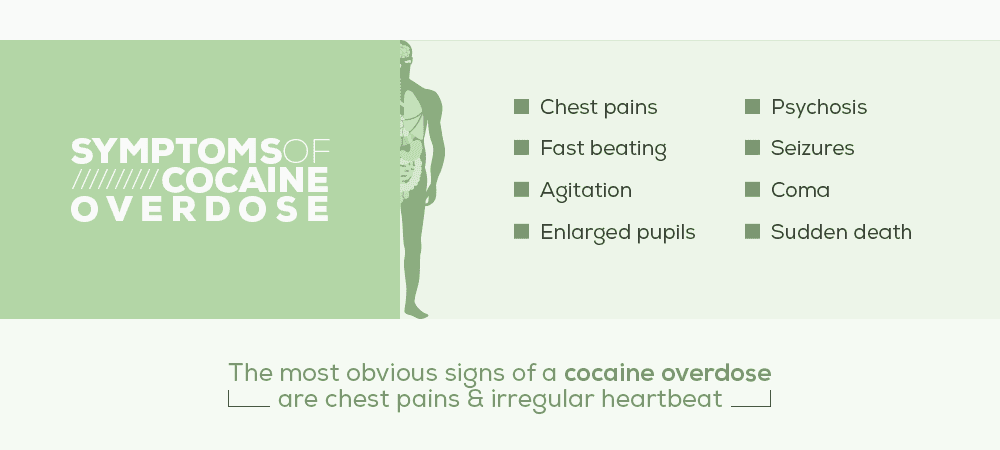
The Effects a Overdose Has on the Body
Not everyone who overdoses on coke dies. You can use too much cocaine and cause serious damage to your body without experiencing an o.d. When heat builds up faster than your body can release it, you experience hyperthermia. The longer your body is in this state, the more likely you are to suffer direct and severe damage your muscle cells. This could result in your body not being able to filter out toxins and may result in kidney failure. When it comes to which organs have the biggest impact on the rest of the body, the heart ranks near the top. Blood courses through veins and arteries at a near-consistent pace. When the oxygen isn’t delivered to an organ, even for a few seconds, it can lead to permanent damage. As such, cocaine abuse increases the possibility of:
- Heart attack
- Stroke
- Seizure
- Respiratory failure
- Cerebral hemorrhage
- Kidney failure
- High blood pressure
Each of these can have lasting consequences and be detrimental to your health.
What is Cocaine Cut With?
One of the most lethal factors when it comes to using coke is the fact that you don’t know what is in it. Dealers will often “cut” their product with other substances by packing the drugs with fillers. This way, they’ll have more to sell and make more money. Dealers may also include certain chemicals into the mix to intensify the buzz felt by the user. This can lead to a higher likelihood of addiction and, thus, repeat business. Unfortunately, this also means that a lot of the cocaine on the street has harmful additives. In fact, levamisole has been found in almost 75 percent of all coke seized by the DEA. (We’ll talk about this in greater detail.) Here are a few of the substances used as fillers:
- Powdered sugar
- Baking soda
- Phenacetin – a painkiller
- Creatine – a bodybuilding supplement
- Boric Acid – an insecticide and disinfectant
- Mannitol – a food flavoring and diuretic
- Paracetamol – a pain reliever also known as acetaminophen
- It is not always the white that causes a toxic reaction when you use this drug. It is often the added chemicals in powder or crack that lead to an overdose.
Levamisole: A Lethal Crack Additive
Levamisole, as mentioned above, is present in the majority of crack on the streets today. It is a chemical used to kill parasitic worms in animals. It’s used by drug dealers because it has a similar texture to rock. Plus, it can produce an effect in the body similar to methamphetamines. This leads the user to believe they are getting good stuff because it makes them feel speedy. Plus, it increases dopamine production in the brain. This further intensifies the euphoric effects caused by the coke itself. You should know that levamisole is highly toxic by itself. Its presence in the body increases the risk of agranulocytosis. This is a severe depletion of the body’s white blood cells and weakening of the immune system. Agranulocytosis has been compared to a “chemical form of AIDS.” The body’s defenses are so fragile that a simple scratch can turn into a life-threatening illness.
Other Synthetic Coke Ingredients
There are loads of other chemicals and substances used in cocaine. Numbing agents are especially popular because coke numbs the mouth. A user will often taste their product before they buy it to make sure it is legit. However, dealers will often cut their product with Lidocaine or Benzocaine. Dentists use these numbing agents to reduce pain or discomfort. Beyond numbing agents, white also includes other chemicals like:
- Caffeine powder
- Hairspray
- Gasoline
- Cement (yes, you read that right!)
- A strong chemical oxidant known as potassium permanganate
- Hydrochloric acid
Studies have shown that the purity of street cocaine today is between 20 and 30 percent. This means 70 to 80 percent of the drug is being made with other substances. Keep this in mind if you are a user. You have no idea what you are putting into your body when you smoke, short, or snort coke. It’s no wonder that coke overdoses are so prevalent.
Mixing Coke with Other Drugs Can Be Deadly
Cocaine is a party drug because people use it at clubs, parties, raves, and bars. Like many other kinds of stimulants, it’s used to intensify the party experience. It can help make people feel more confident when interacting with others. Some say they enjoy music and light shows more intensely. It can also lower inhibitions. But like other party drugs, cocaine is often used with other substances. These include alcohol, amphetamines, prescription opioids, heroin, and benzodiazepines. Coupling coke’s lethal effects with other substances increases the likelihood of an overdose. You should never mix cocaine and alcohol. Cocaethylene could occur, which can lead to a high toxicity in the body that can cause major complications.
Coke with Alcohol and Opioids: A Deadly Mix
Mixing cocaine with any substance can be deadly. But, there are two particular drugs worth warning against: alcohol and opioids. The rising opioid epidemic is impacting the overdose rate. Alcohol and opioids slow down your internal systems. Your heartbeat drops, your breathing becomes shallower, and everything in your body slows to a crawl. When you add a stimulant like cocaine into the mix, the two substances counteract each other. This puts more stress on an already overworked body. The result is a higher risk of complications or overdose.
What are the Dangers of Injecting Cocaine?
Let’s talk about injecting white for a minute. Snorting coke and smoking crack are dangerous methods for using this drug. Shooting it is much worse. Cocaine is water-soluble. It dilutes in water and gets injected into the veins without much preparation. It is very easy to turn powder into a liquid for intravenous use. When transmitted into the blood with a needle, the high is far more intense. Injecting this drug into the veins will often result in:
- Swelling
- Bruising
- Abscesses
- Ulcers
- Internal bleeding
- Scarring
- Infection
- Transmission of disease
Your body has less of a chance to filter cocaine when used intravenously. When smoked or snorted, the toxicity of the drug goes through various safeguards. The lungs, liver, and mucous membranes work together to make certain substances less dangerous. But, when white gets injected, it bypasses most of the body’s defenses. This may lead to a greater high, but it also causes more damage to the internal organs. Also, injecting coke increases the likelihood of contracting diseases. HIV, Hepatitis B and C, and other blood-borne illnesses are common among those who shoot coke. In fact, the spread of these diseases is so common that many communities use needle exchange programs.
Jail Time For Possession of Cocaine
If you get caught with powder or crack by a law enforcement officer, you are going to be in big trouble. Possessing this drug in any state is an automatic felony. It doesn’t matter if you get caught with a little bit of powder or you’re found with a crack pipe. You will get arrested and you will go to jail. Every state handles punishment according to their own laws. Some mandate that you do time in jail or prison. Others make you to go to a court-ordered rehab. You may even have to pay a hefty fine or do community service. No matter what the legal consequences are, you will be a convicted felon. You will forever get labeled as a criminal. It will follow you for the rest of your life.
Cocaine Addiction: The Pain of Withdrawal
Part of the reason this drug is so addictive is the withdrawal symptoms. Most withdrawal symptoms are psychological. They include varying degrees of the conditions below, some of which can be quite severe:
- Depression
- Uncontrollable crying
- Suicidal thoughts
- Anxiety
- Brain fog
- Loss of motivation
- Extreme cravings
- Nightmares
- Insomnia
- Fatigue
- Increased appetite
The reason people are unable to quit cocaine is because of the acute withdrawal symptoms. They are severe. An addicted person will begin craving the drug immediately after they try to quit. It is this intense craving that drives someone to go for more of the drug, even though they don’t want to continue using. Detoxing from cocaine is a very unpleasant experience, to say the least. While withdrawal symptoms can be very intense for the first two weeks, they do begin to subside with time. However, post-acute withdrawal can last for months. Usually, the most difficult symptom to endure is the depression. Without addiction treatment, most people return to the drug to feel good or normal again.
Cocaine Addiction Treatment – If You’re Hooked, You Are Going to Need It
We have only talked about a few of the many negative consequences of addiction. Let’s recap. If you are hooked on powder or smoking crack, you might experience:
- Complete financial devastation
- A deadly overdose
- Physical damage to your body
- Mental psychosis or temporary insanity
- A felony conviction
- Contracting a deadly virus like HIV
These are some pretty good reasons to feel terrified of this drug. If you are using just for fun, stop now before things get out of control. If you are addicted, we want to encourage you to go for cocaine addiction treatment. Most people simply cannot quit using coke without drug rehab. The cravings are too powerful. You may be able to go a few days or weeks – or even a few months – but the odds are against you. Eventually, without help, you are very likely to return to this drug…. even though you don’t want to. If cocaine is ruining your life, we can help. Contact us today for a free, confidential assessment and evaluation over the phone. We can tell you what your treatment options so you can freedom from addiction.
What Did you Think About This Blog?
Give it a Rating!
Full Infographic:
 AddictionResource (n.d.). Cutting Cocaine: The Terrifying Additives Added to Coke. Retrieved from https://addictionresource.com/drugs/cocaine-and-crack/cut-cocaine/ Gosmer, Kim (2014, March). Vice. The Terrifying Substances People Put in Cocaine. Retrieved from https://www.vice.com/en_us/article/vdpb4y/the-cash-is-in-the-cut Leonard, Kimberly (2017, Jan.). U.S. News. What’s Behind the Rise in Cocaine-Linked Deaths? Retrieved from https://www.usnews.com/news/health-care-news/articles/2017-01-03/as-the-opioid-epidemic-evolves-impacts-bleed-into-cocaine-overdose MedlinePlus (2016, May). Substance use – cocaine. Retrieved from https://medlineplus.gov/ency/patientinstructions/000793.htm National Institute on Drug Abuse (2016, June). DrugFacts: Cocaine. Retrieved from https://www.drugabuse.gov/publications/drugfacts/cocaine National Institute on Drug Abuse (2013, May). Drugs of Abuse: Cocaine. Retrieved from https://www.drugabuse.gov/drugs-abuse/cocaine National Institute on Drug Abuse (2016, May). Research Reports: What is Cocaine? Retrieved from https://www.drugabuse.gov/publications/research-reports/cocaine/what-cocaine Substance Abuse and Mental Health Services Administration (2016, March). Stimulants. Retrieved from https://www.samhsa.gov/atod/stimulants
AddictionResource (n.d.). Cutting Cocaine: The Terrifying Additives Added to Coke. Retrieved from https://addictionresource.com/drugs/cocaine-and-crack/cut-cocaine/ Gosmer, Kim (2014, March). Vice. The Terrifying Substances People Put in Cocaine. Retrieved from https://www.vice.com/en_us/article/vdpb4y/the-cash-is-in-the-cut Leonard, Kimberly (2017, Jan.). U.S. News. What’s Behind the Rise in Cocaine-Linked Deaths? Retrieved from https://www.usnews.com/news/health-care-news/articles/2017-01-03/as-the-opioid-epidemic-evolves-impacts-bleed-into-cocaine-overdose MedlinePlus (2016, May). Substance use – cocaine. Retrieved from https://medlineplus.gov/ency/patientinstructions/000793.htm National Institute on Drug Abuse (2016, June). DrugFacts: Cocaine. Retrieved from https://www.drugabuse.gov/publications/drugfacts/cocaine National Institute on Drug Abuse (2013, May). Drugs of Abuse: Cocaine. Retrieved from https://www.drugabuse.gov/drugs-abuse/cocaine National Institute on Drug Abuse (2016, May). Research Reports: What is Cocaine? Retrieved from https://www.drugabuse.gov/publications/research-reports/cocaine/what-cocaine Substance Abuse and Mental Health Services Administration (2016, March). Stimulants. Retrieved from https://www.samhsa.gov/atod/stimulants


